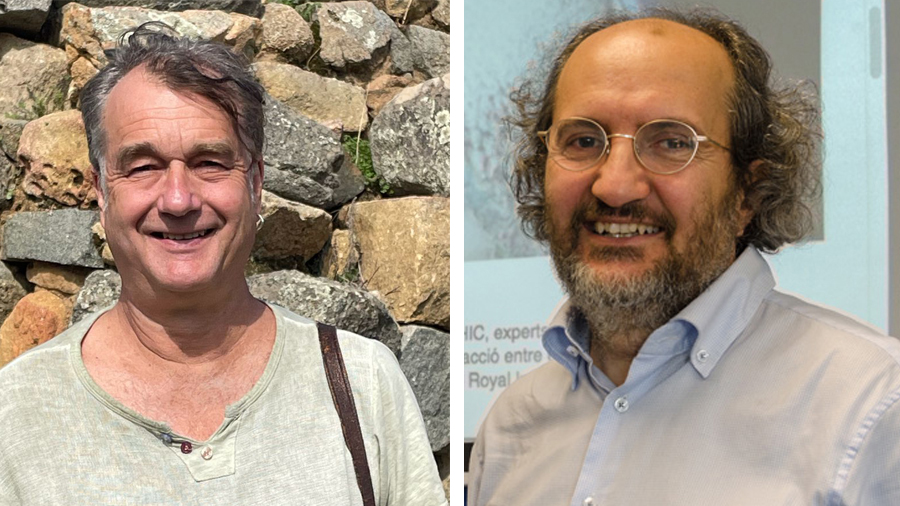Archaeologist Roberto Risch, professor in the Department of Prehistory, and science historian Marco Armiero, ICREA researcher at the Institut d'Història de la Ciència (IHC), receive an Advanced Grant from the European Research Council (ERC) in the 2024 call for proposals.

The ERC has approved grants for 281 of the 2,534 proposals submitted, which will receive a total of €721 million. In the field of social sciences and humanities, 736 projects were submitted, of which 80 were selected. Two of these projects will be led by UAB researchers Roberto Risch and Marco Armiero.
Palaeoeconomic study of the first state societies in Europe
Roberto Risch will carry out the CORNERSTONES project (Disruptive Economies and Macrolithic Technologies in the Euro-Mediterranean Bronze Age). Using the research potential offered by macrolithic tools, he will study the economic factors underlying and connecting the formation, rise and fall of the first state societies in Europe in the Early Bronze Age (3000 and 1500 BCE). These societies, small in number, underwent profound changes that gave rise to centralised and highly unequal economic and political entities occupying vast territories. "The cause of their rapid emergence and, centuries later, sudden collapse, is one of history's most important open questions, particularly in view of their triggering effect on the development of statehood beyond Ancient Mesopotamia and Egypt", explains the researcher.
Macrolithic artefacts, ubiquitous and abundant, have been found in a very wide range of productive processes, from food processing to metal forging, "but little attention has been paid to them in prehistoric archaeology, mainly due to the complexity of the interdisciplinary approach required", says the archaeologist. The palaeoeconomic study will use a set of research tools from the fields of geology, material mechanics, functional analysis, ethnoarchaeology, and network analysis, to compare three of the Euro-Mediterranean Bronze Age societies with disruptive trajectories, such as the Aegean Bronze Age, including Minoan Crete; the Únětice society in Central Europe, and El Argar in the western Mediterranean.
"Research into the economic forces that produced these societies are relevant to understanding highly dynamic economies and institutionalised political organisations in general. The factors of unsustainability that led to their sudden collapse are still poorly understood, but were probably also present in other later and even present-day economies", concludes Risch.
Roberto Risch, professor of Prehistory at the UAB, has successfully tested most of the methods that will be combined in this project on Late Prehistoric macrolithic assemblages from Spain, Germany, Serbia and India. He has also coordinated ethnoarchaeological fieldwork in Ghana, Mali and Guatemala, focusing on the use of these artefacts. His research has included some of the most extensive prehistoric excavations in Europe and large-scale international studies of the ancient environment and aDNA. He has also organised and participated in a remarkable number of museum exhibitions, as well as documentary films, some of which have won awards.
The historical relationship of the Catholic Church with the environment
Marco Armiero will develop CATCH (The Catholic Church and the environment) to provide the first environmental history of the Catholic Church and understand its influence on environmental visions, policies and realities. "Scholars have explored the intersection of religion and the environment from theological and philosophical perspectives, leaving historical relationships unexamined. This oversight is significant given the Catholic Church's global influence, including its participation in major environmental conferences and its potential impact on 1.5 billion people", says Armiero. The project will span from the 1960s, when Vatican II became intertwined with the environmental hopes of that period, to the 2000s, with the election of pope Francis, who positioned himself as a champion against climate change.
The study will address the environmental engagement of the Catholic Church across multiple scales. Globally, it will examine its role in environmental governance at international conferences and UN debates. Regionally, it will analyse the CC's diverse experiences of engagement with environmental issues through case studies in South and North America (Brazil and the United States), Europe (Italy), Asia (The Philippines), and Africa (South Africa). The analysis will draw on historical methods and practices, with approaches also from the environmental humanities and political ecology. It will also integrate oral history "to understand in depth the life trajectories of key church members involved in environmental negotiations, as well as grassroots experiences, often almost invisible in written sources", Armiero explains. Additionally, the project will adopt methodologies inspired by the principles of citizen science.
The project team will include 5 PhD students, 1 postdoc, and 1 research assistant, supported by 4 senior researchers—each an expert in one of the case studies—and an ethical advisory board with two leading theologians, one from Oxford and the other from Cape Town. Materials to be produced by the project include, among others, an open access oral history repository and a video documentary.
Marco Armiero is currently ICREA research professor in the Department of Philosophy at the UAB. A renowned leading expert in environmental history, he has researched areas such as the history of environmentalism, environmental justice and the politics of nature. "With this project I am entering a new research area, even though all my work connecting environmental issues, social justice, and politics has prepared me for this new ground, in which there is a gigantic bibliographical gap", says the researcher.
Both CORNERSTONES and CATCH will start in 2026. Endowed with approximately €2.5 million each, the projects will run for five years.






